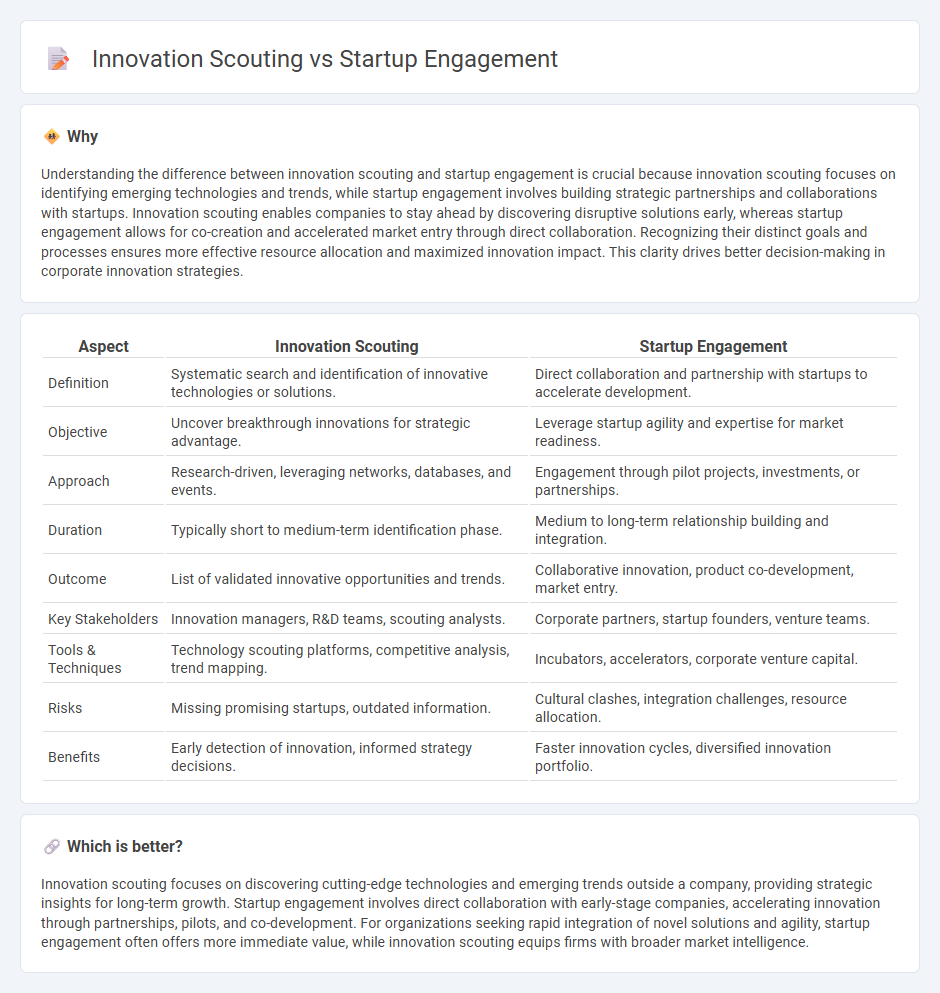
Innovation scouting identifies emerging technologies and trends by systematically analyzing startups and market dynamics to inform strategic decisions. Startup engagement involves building collaborative partnerships and providing support to startups for mutual growth and accelerated innovation implementation. Discover how combining these approaches can drive competitive advantage and business transformation.
Why it is important
Understanding the difference between innovation scouting and startup engagement is crucial because innovation scouting focuses on identifying emerging technologies and trends, while startup engagement involves building strategic partnerships and collaborations with startups. Innovation scouting enables companies to stay ahead by discovering disruptive solutions early, whereas startup engagement allows for co-creation and accelerated market entry through direct collaboration. Recognizing their distinct goals and processes ensures more effective resource allocation and maximized innovation impact. This clarity drives better decision-making in corporate innovation strategies.
Comparison Table
| Aspect | Innovation Scouting | Startup Engagement |
|---|---|---|
| Definition | Systematic search and identification of innovative technologies or solutions. | Direct collaboration and partnership with startups to accelerate development. |
| Objective | Uncover breakthrough innovations for strategic advantage. | Leverage startup agility and expertise for market readiness. |
| Approach | Research-driven, leveraging networks, databases, and events. | Engagement through pilot projects, investments, or partnerships. |
| Duration | Typically short to medium-term identification phase. | Medium to long-term relationship building and integration. |
| Outcome | List of validated innovative opportunities and trends. | Collaborative innovation, product co-development, market entry. |
| Key Stakeholders | Innovation managers, R&D teams, scouting analysts. | Corporate partners, startup founders, venture teams. |
| Tools & Techniques | Technology scouting platforms, competitive analysis, trend mapping. | Incubators, accelerators, corporate venture capital. |
| Risks | Missing promising startups, outdated information. | Cultural clashes, integration challenges, resource allocation. |
| Benefits | Early detection of innovation, informed strategy decisions. | Faster innovation cycles, diversified innovation portfolio. |
Which is better?
Innovation scouting focuses on discovering cutting-edge technologies and emerging trends outside a company, providing strategic insights for long-term growth. Startup engagement involves direct collaboration with early-stage companies, accelerating innovation through partnerships, pilots, and co-development. For organizations seeking rapid integration of novel solutions and agility, startup engagement often offers more immediate value, while innovation scouting equips firms with broader market intelligence.
Connection
Innovation scouting identifies emerging technologies and disruptive startups that align with a company's strategic goals. Startup engagement involves collaboration and partnership to accelerate innovation and integrate novel solutions into existing business models. Together, they create a continuous pipeline of breakthrough ideas, reducing time-to-market and enhancing competitive advantage.
Key Terms
Problem-Solution Fit
Startup engagement focuses on building collaborative relationships to validate and enhance the problem-solution fit, ensuring innovative ideas address real market needs effectively. Innovation scouting systematically identifies and evaluates startups with promising technologies or solutions aligned with strategic business goals, emphasizing potential impact and scalability. Explore how aligning these approaches can drive successful innovation outcomes in your organization.
Open Innovation
Startup engagement facilitates collaboration by integrating emerging companies into established business models, accelerating product development and market adaptation. Innovation scouting systematically identifies and evaluates novel technologies and solutions to drive corporate innovation strategies and competitive advantage. Explore more insights on advancing Open Innovation through effective startup engagement and innovation scouting practices.
Partnership Pipeline
Startup engagement emphasizes building long-term relationships and collaboration opportunities within the innovation ecosystem, driving co-creation and tailored solutions through direct interaction. Innovation scouting focuses on systematically identifying and evaluating emerging technologies, startups, and market trends to feed the pipeline with high-potential innovations. Explore strategies to optimize your partnership pipeline for sustained competitive advantage and growth.
Source and External Links
The Startup Engagement Playbook: Drive Innovation and Growth - Effective startup engagement drives growth and innovation through clear strategies such as corporate accelerator programs and partnerships, emphasizing communication, trust, and customization based on objectives, while weighing pros and cons like brand reputation gain versus resource intensity and coordination challenges.
Startup Engagement - Silicon Valley Innovation Center - This center specializes in helping established enterprises manage a portfolio of startup engagements for innovation, offering services such as startup scouting, partnership agreements, pilot management, and tailored deliverables to maximize innovation returns.
8 Types of Corporate-Startup Engagement Models with Examples - There are eight common models for corporate-startup engagement, including sponsorship, reverse pitching, mentoring, and accelerators, each with distinct benefits and limitations to consider when selecting the right way to collaborate with startups.
 dowidth.com
dowidth.com